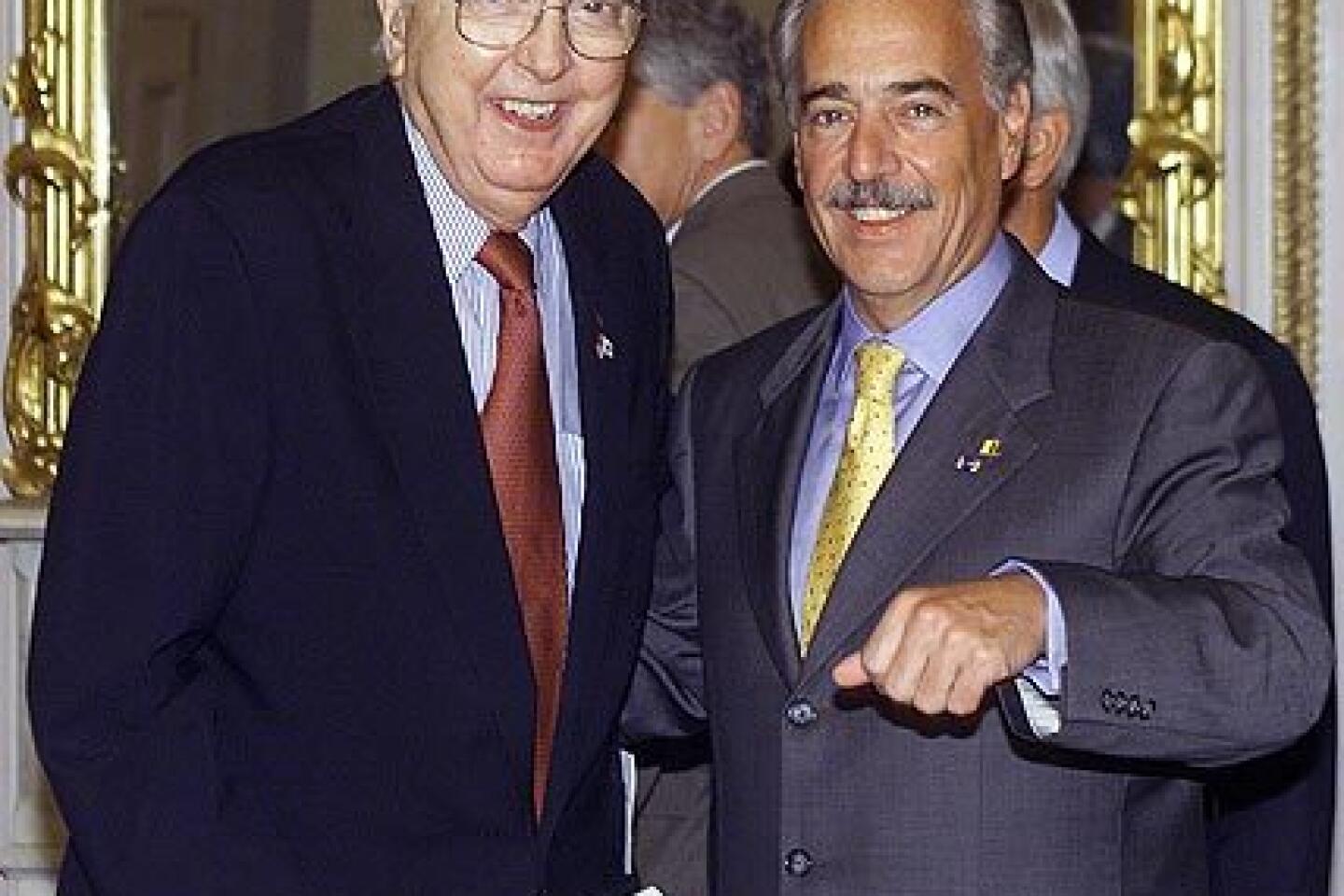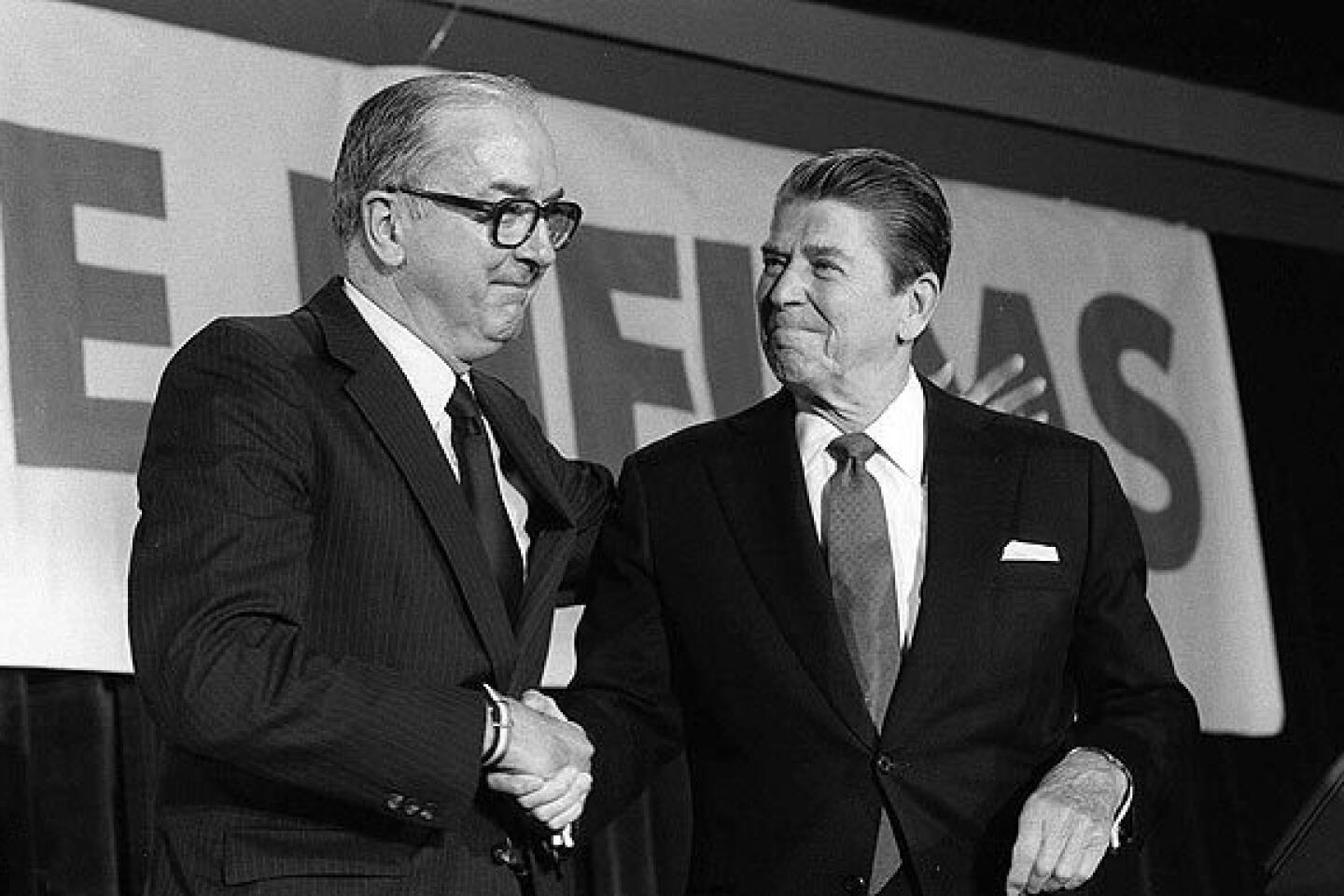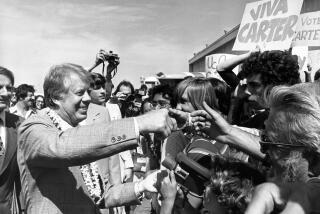Former Sen. Jesse Helms dies at 86
WASHINGTON — Jesse Helms, the former U.S. senator from North Carolina who for half a century infuriated liberals with his race-baiting campaign tactics and presidents of both parties with his use of senatorial privilege, died Friday. He was 86.
Helms, who won election to the Senate five times before retiring in 2003, died early Friday at a nursing home in Raleigh, N.C., according to John Dodd, president of the Jesse Helms Center in Wingate, N.C. No cause of death was given, but his family said in 2006 that he had been diagnosed with vascular dementia.
FOR THE RECORD:
Helms’ death: The obituary of former Sen. Jesse Helms in Saturday’s Section A incorrectly described the nomination of William F. Weld to be U.S. ambassador to Mexico. Weld was nominated by President Clinton, not President Reagan; his nomination came after he served as governor of Massachusetts, not before. —
FOR THE RECORD:
Helms obituary: The obituary of former North Carolina Sen. Jesse Helms in Sunday’s Section A said he was the only senator to vote against making the Rev. Martin Luther King Jr.’s birthday a national holiday. The Senate vote on the bill was 78-22. —
“Jesse Helms was a kind, decent and humble man and a passionate defender of what he called ‘the Miracle of America.’ So it is fitting that this great patriot left us on the Fourth of July,” President Bush said in a statement Friday.
Commentator Patrick J. Buchanan, speaking Friday on MSNBC, put Helms in the company of President Reagan, calling the former senator “the second most important conservative of the second half of the 20th century.”
A registered Democrat in the years before he ran for the Senate in 1972, Helms was not the only Southerner of his generation to defect to the Republicans after the Democratic Party championed the cause of civil rights and, as he put it, “veered so far to the left nationally.” Nor was he, at his death, the only politician defending the traditional values of a rural South that had long since been urbanized.
But Helms will be remembered as different from his contemporaries in that he was unyielding on issues that were important to him. Unlike other conservatives, such as Mississippi’s former Sen. Trent Lott or Georgia’s former Rep. Newt Gingrich, who fought for their causes but found ways to reach accord with Democrats, Helms seldom gave in.
No compromising
“Compromise, hell!” Helms, who acquired the nickname “Senator No,” wrote in 1959.
Unlike other symbols of segregation -- such as Alabama’s Gov. George C. Wallace and South Carolina’s longtime Sen. Strom Thurmond, who eventually recanted their opposition to racial integration -- Helms held firm. He rarely reached out to black voters, who in the 2000 census composed nearly 25% of North Carolina’s population.
The key to Helms’ longevity was a political strategy that allowed him to win election without appealing to the mainstream. The use of direct mail to solicit campaign funds nationally was pioneered in the 1960s, but Helms perfected the approach. He sought campaign contributions from conservatives nationally, then used their money to air inflammatory advertisements that energized the passions of his conservative base at home.
“He needed the white vote to win,” said Merle Black, a professor of political science at Emory University. “To get that, he had to use explicit racial themes. His was a kind of primitive conservatism.”
Helms never won with more than 56% of the vote, but he maintained a devoted core constituency.
“He was a loud and clear voice for muscular, principled conservatism,” said Whit Ayres, a pollster for many Southern candidates. “He was ideologically consistent, and he didn’t bend with the wind.”
Often, he was the lone voice of dissent in a Senate of often like-minded members. He fought with his Republican colleagues as often he did against as his Democratic counterparts. He was the only senator to vote against confirming Henry A. Kissinger as secretary of State during the Nixon administration and Frank C. Carlucci as secretary of Defense during the Reagan presidency. And he was the only senator to vote against making the Rev. Martin Luther King Jr.’s birthday a national holiday. His lone dissent came only after he conducted a 16-day filibuster against the King holiday, during which Helms took to the Senate floor to decry the assassinated King, a pacifist and civil rights leader, for his “action-oriented Marxism.”
Helms often prevailed by sheer stubbornness, wearing down opponents. As chairman of the Senate Agriculture Committee in the 1980s, he protected tobacco’s federal subsidy against growing pressure from anti-smoking groups. As chairman of the Senate Foreign Relations Committee in the 1990s, he held up U.S. dues to the United Nations -- $926 million -- until the bureaucratically overgrown organization slimmed down.
Target issues
And on any number of issues, he pushed his conservative agenda in the Senate. Sending colleagues copies of the controversial gay-oriented artwork of photographer Robert Mapplethorpe, he asked in 1989 if the government should be funding it -- and threatened cuts in the budget of the National Endowment for the Arts. Introducing a constitutional amendment to ban abortions, he likened the procedure to the Holocaust.
To try to force inclusion of an amendment encouraging prayer in public schools, he filibustered against a bill setting national standards for education. He pushed unsuccessfully for an amendment to the Americans with Disabilities Act, a bill approved in 1990 with vigorous bipartisan support, that would have barred employees with AIDS from handling food at restaurants.
His obstinacy in foreign policy, where pragmatism often guides debate, was remarkable. Few administrations escaped his wrath. He condemned President Nixon’s historic 1972 trip to Beijing as “appeasing Red China.” He castigated President Carter, saying he “gave away the Panama Canal.” And after the newly elected President Clinton proposed that gays be allowed to serve openly in the military, Helms said that Clinton “better have a bodyguard” if he visited North Carolina.
Colored by a passion against communism, Helms never relinquished his animus toward Cuba’s Fidel Castro (he was coauthor of the 1996 Helms-Burton Act, which penalized companies doing business with Cuba), and he backed the Contra rebels in Nicaragua seeking to overthrow the Marxist government of Daniel Ortega. He backed right-wing authoritarians who ran death squads in El Salvador, and the military in Guatemala.
To the annoyance of both Democratic and Republican presidents, he used the Senate’s confirmation power to block nominees he didn’t like. Robert A. Pastor, a former Carter administration Latin American expert, never became ambassador to Panama. William F. Weld, before he was elected governor of Massachusetts, never became Reagan’s ambassador to Mexico -- despite the intervention of such stalwart Republicans as Sen. Richard G. Lugar of Indiana. James C. Hormel, a philanthropist and gay activist from San Francisco, did become ambassador to Luxembourg, but only after Helms’ objections forced Clinton to wait until after Congress left town, dooming Hormel to a shortened tenure.
Because of Helms, several major treaties never became law: The Kyoto Protocol against global warming, the Comprehensive Test Ban Treaty, the proposed land mine treaty -- all were stopped at his insistence.
Helms’ demagoguery was a lightning rod for liberals. He called homosexuals “weak, morally sick wretches.” During debate on a 1988 AIDS bill sponsored by Sens. Edward M. Kennedy (D-Mass.) and Orrin G. Hatch (R-Utah), Helms said, “There is not one single case of AIDS in this country that cannot be traced in origin to sodomy.”
When Helms announced his retirement in 2001, Kevin Siers, the editorial cartoonist for the Charlotte (N.C.) Observer, depicted the news with a drawing of a Confederate flag at half-staff.
Just as striking was the comment from Skip Alston, president of the North Carolina chapter of the NAACP: “Jim Crow Sr. is about to retire after spreading his venom of racism and hate for almost 30 years. Jesse Helms’ only lasting legacy will be one of prejudice and mean-spiritedness.”
Jesse Alexander Helms Jr. was born Oct. 18, 1921, in Monroe, N.C., a small town southeast of Charlotte in the Piedmont region. His father was police chief of Monroe. Helms attended Wingate Junior College and Wake Forest University but did not graduate.
Journalism years
One of his first jobs after leaving college was as a sportswriter for the News & Observer in Raleigh. There he met Dorothy Coble, the paper’s society reporter. The couple married in 1942. They had two daughters and adopted a 9-year-old boy with cerebral palsy who had said in a newspaper article that he wished for a family.
During World War II, Helms served stateside in the Navy as a recruiter. After the war, he became city editor of the Raleigh Times and wrote columns reminiscing about his upbringing in the South.
“I shall always remember the shady streets, the quiet Sundays, the cotton wagons, the Fourth of July parades, the New Year’s Eve firecrackers. I shall never forget the stream of school kids marching uptown to place flowers on the Courthouse Square monument on Confederate Memorial Day,” Helms wrote in 1956.
He eventually went into radio and television, which would be a boon to his political career.
From the beginning, Helms was schooled in the political device of using race to propel white conservatives to the polls. As news director for WRAL radio, Helms supported Willis Smith in his 1950 Senate campaign against Frank Porter Graham, the former president of the University of North Carolina. The campaign theme was that Graham favored interracial marriages. “White people, wake up before it is too late,” said one ad. “Do you want Negroes working beside you, your wife and your daughters, in your mills and factories? Frank Graham favors mingling of the races.”
The campaign’s further contribution to political notoriety was a handbill that showed Graham’s wife dancing with a black man.
When Smith won, Helms went to Washington as his administrative assistant.
Upon Smith’s death in 1953, Helms returned home to work for the North Carolina Bankers Assn., turning the group’s monthly magazine into a platform for his political views. He was persuaded to run for a City Council seat in Raleigh.
But before long, Helms found his real calling as a nightly television commentator for WRAL in North Carolina, a post he held from 1960 to 1972. He blasted the “pinkos” and “Yankees” in Washington, and criticized King’s inner circle of civil rights leaders for “proven records of communism, socialism and sex perversion.” He railed against Social Security, calling it “nothing more than doles and handouts.”
Persuaded by conservative voters to run for the Senate, Helms continually showcased the campaign tactics that would mark his career.
In the 1972 race, pitted against a Democratic congressman from Durham, Helms used code words that enraged liberals. The congressman’s name was Nick Galifianakis. Helms’ slogan: “Elect Jesse Helms -- He’s One of Us.”
His next big challenge was in 1984, from moderate Democrat Jim Hunt, a popular two-term governor who was points ahead in the polls a year before the election. Then Helms launched his filibuster against the King holiday, a tactic that proved so popular in North Carolina that Hunt’s lead was cut in half.
On election day, Helms won 63% of the white vote, according to the Voters Education Project, a nonprofit advocacy group in Atlanta. Hunt got nearly 99% of the black vote, but the turnout -- 61% of the state’s blacks registered -- was not enough to overcome Helms’ appeal in rural eastern North Carolina. It helped, too, that Reagan was atop the GOP ticket and was overwhelmingly reelected.
Perhaps the most infamous Helms race was in 1990, when he ran against Harvey Gantt, a black architect and former mayor of Charlotte. The campaign became notorious among strategists for a television ad showing a white man’s hands crumpling a rejected job application as a voice intoned: “You needed that job. And you were the best qualified. But they had to give it to a minority because of a racial quota. Is that really fair? Harvey Gantt said it is.”
The so-called “white hands ad” had an immediate effect. “Gantt was leading until that ad,” recalled Emory University’s Merle Black. “His people were really brokenhearted.” Gantt lost that election as well as a rematch six years later.
Ferrel Guillory, a longtime Helms watcher who directed the liberal editorial page at the News & Observer in Raleigh when Helms was at the peak of his senatorial power, called him “a man of the small-town rural traditionalist South.”
Helms never forgot, never changed. “It was part of his political appeal, too,” said Guillory, who now runs a program on Southern politics and media at the University of North Carolina. “They always said, ‘You know where Jesse stands.’ ”
Helms had suffered from ill health in recent years. He had open-heart surgery in 2002 to replace a worn-out pig valve installed 10 years earlier. He had knee replacement surgery in 1998 and was diagnosed in 2000 with “peripheral neuropathy,” a condition that numbed his feet and impaired his balance, forcing him to ride through the halls of Congress in a motorized scooter.
Helms is survived by his wife of 65 years, Dorothy, three children, seven grandchildren and one great-grandchild, all of North Carolina.
Services are scheduled for Thursday in Raleigh.
johanna.neuman @latimes.com
Times staff writer Peter Spiegel contributed to this report.
More to Read
Sign up for Essential California
The most important California stories and recommendations in your inbox every morning.
You may occasionally receive promotional content from the Los Angeles Times.














